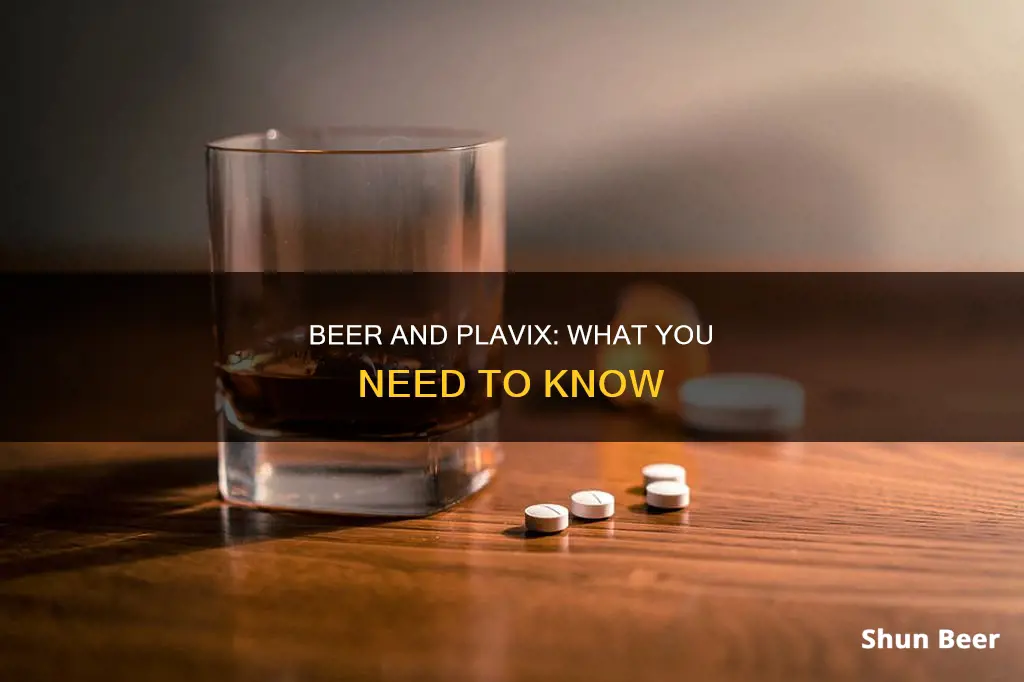
Plavix (clopidogrel) is a prescription drug used to lower the risk of heart attacks and strokes in adults. While there are no known interactions between Plavix and alcohol, consuming large amounts of alcohol while taking Plavix can increase the risk of certain side effects, such as bleeding. This is because both alcohol and Plavix can affect the body's ability to form blood clots, and excessive alcohol consumption can also lead to gastritis, or inflammation of the stomach lining, which can result in bleeding. Therefore, it is recommended to consult a doctor before drinking alcohol during Plavix treatment to understand the risks and safe consumption limits.
| Characteristics | Values |
|---|---|
| Known interaction between Plavix and beer | No known interaction |
| Increased risk when drinking beer with Plavix | Increased risk of bleeding |
| Recommendations | Consult a doctor before drinking beer while taking Plavix |
What You'll Learn

Plavix and alcohol may increase the risk of bleeding
Plavix (clopidogrel) is a prescription drug used to decrease the risk of heart attacks and strokes in adults. It is known as a blood thinner or an antiplatelet drug, which means it makes it harder for your blood to clot. While there are no known interactions between Plavix and alcohol, consuming alcohol during Plavix treatment can increase your risk of certain side effects, especially bleeding.
Plavix can increase your risk of bleeding, and if you are currently bleeding, taking Plavix can make your condition worse. This includes internal bleeding, such as that caused by a stomach ulcer. Alcohol consumption, especially in large quantities, can also increase your risk of bleeding. Therefore, drinking alcohol while taking Plavix may further increase your risk of bleeding.
If you drink alcohol, it is important to discuss this with your doctor before starting Plavix treatment. They can advise you on how much alcohol, if any, may be safe to consume during your treatment. It is also important to be aware of the signs of bleeding and to seek medical attention if you experience any unusual bleeding or bruising, prolonged bleeding from cuts, increased menstrual flow, bleeding gums, nosebleeds, blood in your urine or stools, or vomiting blood.
In addition to increasing the risk of bleeding, combining alcohol and Plavix may also affect the effectiveness of Plavix. Drinking large amounts of alcohol over time can increase your risk of gastritis (inflammation of the stomach lining), which can result in bleeding. Alcohol can also affect the liver's ability to metabolize Plavix, potentially leading to increased levels of the drug in the bloodstream and an increased risk of side effects.
It is important to note that the combination of alcohol and Plavix may affect individuals differently. Factors such as age, liver function, and medical history can influence the risks associated with drinking alcohol while taking Plavix. Therefore, it is always advisable to consult with a doctor or pharmacist before consuming alcohol with any medication, including Plavix.
Beer and Braces: What You Need to Know
You may want to see also

Plavix and alcohol may increase the risk of gastritis
Plavix (clopidogrel) is a prescription drug used to lower the risk of heart attacks and strokes in adults. It works by making it harder for the blood to clot, which can be useful in preventing heart attacks and strokes caused by clots. However, this also means that Plavix can increase the risk of bleeding, a known side effect of the drug.
While there is no known interaction between Plavix and alcohol, consuming large amounts of alcohol over time can increase the risk of gastritis, or inflammation of the stomach lining, which can result in bleeding. As Plavix also increases the risk of bleeding, drinking large amounts of alcohol while taking Plavix may further increase the risk of this side effect.
Drinking alcohol while taking Plavix can also increase the risk of other side effects, such as internal bleeding, especially if you have a condition like a stomach ulcer. It is important to discuss alcohol consumption with your doctor before starting Plavix treatment, as they can advise you on how much alcohol, if any, is safe to consume during your treatment. They may recommend that you limit your alcohol intake or suggest alternative treatments.
It is important to note that combining alcohol with certain medications, such as blood thinners, can be dangerous. Alcohol can interfere with how well some medications work and increase the risk of side effects. Therefore, it is always advisable to consult a doctor or pharmacist before drinking alcohol with any new medication.
Root Beer and Breastfeeding: Is It Safe?
You may want to see also

Plavix and alcohol may increase the risk of side effects
Plavix (clopidogrel) is a prescription drug used to lower the risk of heart attacks and strokes in adults. While there are no known interactions between Plavix and alcohol, consuming alcohol during Plavix treatment can increase the risk of certain side effects.
Plavix works by inhibiting blood clotting, thereby reducing the risk of cardiovascular events like heart attacks and strokes. However, this mechanism also increases the risk of bleeding, which is a known side effect of Plavix. Alcohol consumption, especially in large quantities, can also increase the risk of bleeding. Therefore, drinking alcohol while taking Plavix may further elevate the likelihood of bleeding.
Additionally, consuming large amounts of alcohol over time can increase the risk of gastritis, or inflammation of the stomach lining, which can result in bleeding. As Plavix also has the potential to cause stomach bleeding, drinking alcohol while on Plavix treatment may increase the risk of this side effect.
It is important to note that the combination of alcohol and Plavix may have varying effects on different individuals. Some people may be more susceptible to the potential side effects of this combination than others. It is always advisable to consult a doctor or pharmacist before consuming alcohol with any medication, including Plavix. They can provide personalised advice and recommendations based on your medical history and current health status.
If you are taking Plavix, it is crucial to be vigilant for any signs or symptoms that may indicate bleeding. These can include unusual bleeding or bruising, vomiting, prolonged bleeding from cuts, increased menstrual flow, bleeding gums, nosebleeds, blood in urine or stools, black stools, headache, dizziness, or weakness. If you experience any of these symptoms, it is important to contact your doctor promptly.
Beer and Ice Cream: A Match Made in Heaven?
You may want to see also

Plavix and alcohol may not be safe for people with liver problems
Plavix (clopidogrel) is a prescription drug used to reduce the risk of heart attacks and strokes in adults. While there are no known interactions between Plavix and alcohol, consuming large amounts of alcohol can increase the risk of certain side effects. For example, both alcohol and Plavix can increase the risk of bleeding. Therefore, drinking alcohol while taking Plavix may further increase this risk.
People with liver problems should be especially cautious when combining Plavix and alcohol. Alcohol is broken down and excreted by the liver, and heavy alcohol use can decrease the liver's ability to perform these functions. This can lead to an increased concentration of Plavix in the bloodstream, potentially resulting in a higher risk of bleeding.
Additionally, alcohol can affect the production of fibrinogen, a protein produced by the liver that promotes blood clotting. By reducing fibrinogen levels, alcohol can further increase the risk of bleeding.
It is important to note that the combination of Plavix and alcohol may not be safe for everyone. People with a history of bleeding problems, such as hemophilia, or those who are pregnant or breastfeeding, may be advised to avoid alcohol completely while taking Plavix. It is always recommended to consult with a doctor or pharmacist to determine if it is safe to consume alcohol while taking Plavix, especially for those with liver problems or other health conditions.
Drinking Beer at the Airport: Lobby Laws and Limits
You may want to see also

Plavix and alcohol may not be safe for people with kidney problems
Plavix (clopidogrel) is a prescription drug used to decrease the risk of heart attacks and strokes in adults. It is known to increase the risk of bleeding and, in some cases, internal bleeding. While there are no known interactions between Plavix and alcohol, consuming alcohol during Plavix treatment can increase the risk of certain side effects, such as bleeding.
Drinking a lot of alcohol can increase the risk of bleeding, and Plavix can also cause bleeding. Therefore, drinking alcohol while taking Plavix may further increase the risk of this side effect. It is important to note that people with kidney problems may be particularly vulnerable to the side effects of Plavix and alcohol.
If you drink alcohol, it is crucial to consult your doctor about the amount that may be safe for you while taking Plavix. They will consider your kidney health, as well as other factors, to determine the appropriate amount of alcohol consumption during your Plavix treatment.
- The combination of Plavix and alcohol may be unsafe for people with kidney problems.
- Plavix can increase the risk of bleeding, and consuming alcohol can further elevate this risk.
- People with kidney problems may be more susceptible to the side effects of Plavix and alcohol.
- It is essential to consult a doctor to determine the safe amount of alcohol consumption while taking Plavix, especially for those with kidney issues.
Root Beer's Alcoholic Mystery: Beverage's Surprising History
You may want to see also
Frequently asked questions
There is no known interaction between taking Plavix and drinking alcohol. However, consuming large amounts of alcohol can increase the risk of bleeding, which is already a side effect of Plavix. It is recommended that you consult your doctor about how much alcohol is safe to consume while taking Plavix.
The side effects of Plavix include an increased risk of bleeding, including severe bleeding. It is important to note that Plavix should not be taken if you have an active bleed, such as a stomach ulcer or brain bleed, as it can make the bleeding worse.
Yes, there are several drugs that can interact with Plavix, including omeprazole (Prilosec), esomeprazole (Nexium), rifampin (Rimactane), ibuprofen (Advil, Motrin), sertraline (Zoloft), and warfarin (Jantoven). These drugs can increase the risk of side effects or decrease the effectiveness of Plavix.
Yes, it is safe to consume coffee and other caffeinated beverages while taking Plavix. There are no known interactions between Plavix and caffeine.
There are no known interactions between Plavix and food. However, it is recommended to consult your doctor if you have any concerns or questions about your diet while taking Plavix.







